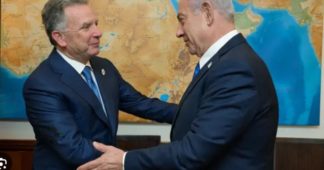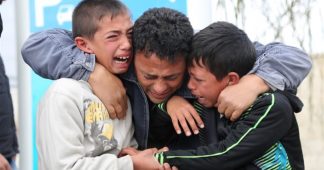By Qassam Muaddi
Aug 7, 2025
Netanyahu chose to blow up the ceasefire and starve Gaza’s population in order to force a surrender from Hamas, while top military and security officials favored moving to the second phase of a ceasefire, leaked cabinet meeting minutes reveal.
Israel decided to starve the people of Gaza as a strategy of war and in order to sabotage the ceasefire deal, according to Israeli cabinet meeting minutes leaked on Wednesday to Israel’s Channel 13.
The document purports to show that Israeli Prime Minister Benjamin Netanyahu refused multiple proposals that would have secured the release of the remaining Israeli captives during the ceasefire between January and March 2025. Netanyahu decided to break the ceasefire, against the advice of top Israeli military and security officials, and to cut off all aid to Gaza to “force Hamas to surrender,” the leak shows.
The Israeli cabinet’s meeting, dated March 1, was to discuss the fate of the ceasefire with Hamas as the first phase of the agreement was set to expire. The prospective second phase of the ceasefire was supposed to see the beginning of talks on the permanent end of the war. The minutes released by Channel 13 show that army and intelligence officials argued for concluding the ceasefire deal, while cabinet ministers opposed it.
The minutes also revealed that a senior Israeli security official told the ministers that “it is possible to secure the release of more captives, but that requires engaging in talks about phase two — ending the war.” The government, however, led by Netanyahu, rejected the proposal. He was backed by Israeli Minister of Strategic Affairs, Ron Dermer, who reportedly said that Israel was “not prepared to end the war while Hamas remains in power.” Dermer, who supports Netanyahu’s hardline position on Gaza, was named by the Prime Minister as head of the negotiating team in the ceasefire talks.
Also backing Netanyahu’s refusal was hardline Finance Minister Bezelel Smotrich, who lashed out at military and intelligence officials, insisting that they were “misleading the public” into thinking Israel could “stop the war and return to it later,” which Smotrich regarded as “ignorance.”
For his part, Israeli Defense Minister, Israel Katz, supported a partial deal, saying that, “If Hamas returns even a number of hostages — less than half — that’s excellent.”
On March 18, Israel broke the ceasefire by launching a wave of bombings on Gaza, killing 400 Palestinians, mostly civilians, in the first minutes of the onslaught. Israel also announced the complete closing of the crossing points, causing an immediate drop in available goods in the strip and cutting off the entry of humanitarian aid. The continuation of the blockade caused the spread of severe hunger, which UN agencies have qualified as famine. UNICEF has called the deaths of Palestinian children due to starvation “unconscionable”.
Israel also halted the work of UN agencies in Gaza, limiting the distribution of the little aid it began to allow in since April to the Gaza Humanitarian Foundation (GHF). The GHF is the controversial Israeli-backed and U.S.-run organization that replaced the UN in May, and has forced Palestinians to travel to four distribution centers in the southern Gaza Strip to collect aid. The centers have been described as “death traps” that use aid as “bait” to lure Palestinians into southern Gaza. There, the Israeli army opens fire on aid-seekers, resulting in numerous recorded “aid massacres.” As of the time of writing, 1,561 people have been killed at GHF sites or while waiting for aid trucks in the north, according to the Ministry of Health in Gaza.
According to the Health Ministry, some 160 Palestinians, including 90 children, have died due to malnutrition brought on by starvation.
Free speech is under attack—especially when it comes to Palestine.
From the censorship of student voices to the assassinations of journalists in Gaza, the cost of telling the truth about Palestine has never been higher. At Mondoweiss, we publish fearless reporting and critical analysis that others won’t touch—because we believe the public needs to know the truth about Palestine.
Read also:
‘Genocidal Policy’: World Reaction to Israel’s Gaza City Occupation Plan
We remind our readers that publication of articles on our site does not mean that we agree with what is written. Our policy is to publish anything which we consider of interest, so as to assist our readers in forming their opinions. Sometimes we even publish articles with which we totally disagree, since we believe it is important for our readers to be informed on as wide a spectrum of views as possible.










